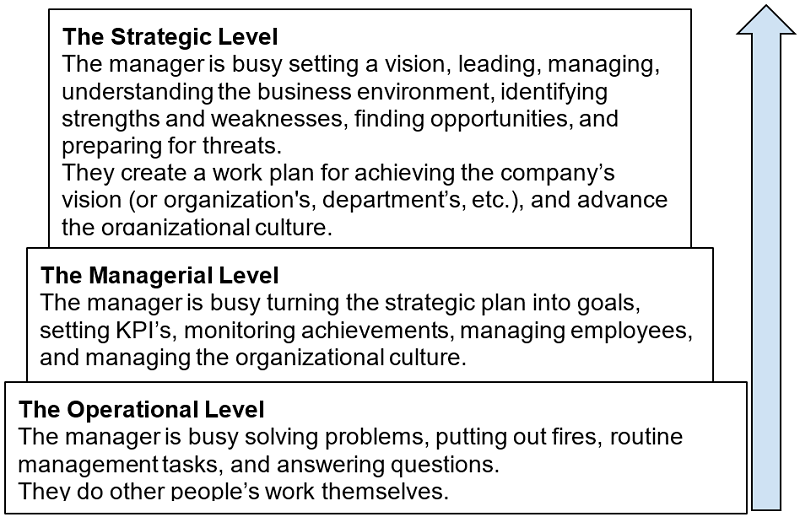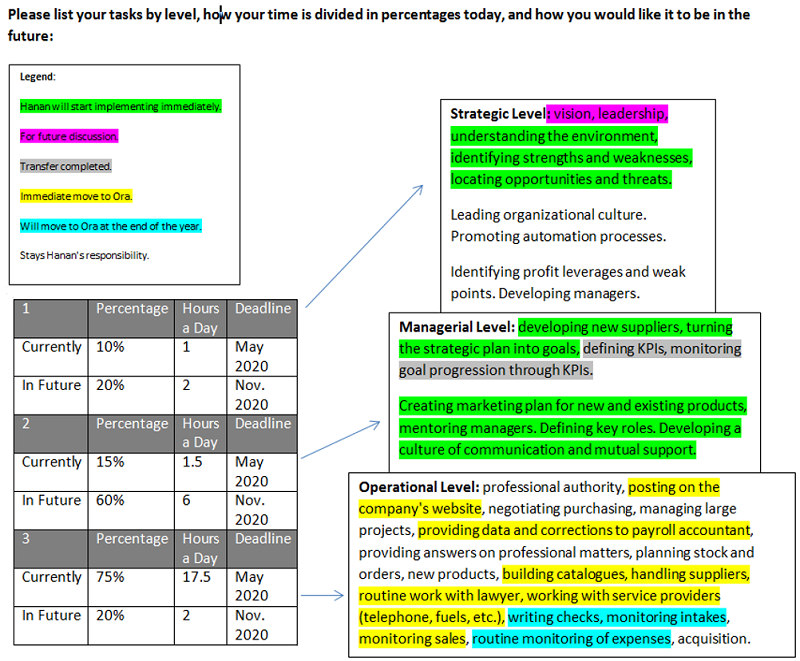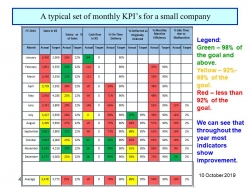This article references The Harvard Business Review Manager's Handbook.
One of the questions I routinely ask managers is, how much of their time they spend doing their employees’ jobs (putting out fires, problem solving, answering questions).
I show them the below scheme (given to me by Anat Millner Cohen) and ask them how much time they spend on each category.
Most, almost all, say they spend 70% to 95% of their time at the operational level. A level which, as you can see below, includes mostly activities which could be delegated, or have officially been delegated.

Managers Who Won’t Delegate
Managers who spend most of their time at the operational level are actually doing work that should be done by those below them, and thus don’t have time to do tasks only they can do.
These types of managers have trouble delegating. By this I mean they do their reports’ work, or interfere with their work. Make decisions instead of them, or worse, give contradictory instructions to those given by their reports.
We don’t usually talk about how this means they have less time to do their actual work.
At the end of the day we all spend a set number of hours working, and we choose what to do during those hours.
If we perform tasks another employee can perform, it by definition takes time away from tasks only we can do. And if a manager or CEO is able to do all the work, theirs and their reports’, then there are two options: either they aren’t aware of the important tasks only they can do, or there’s a redundant manager (or managers) under them.
Why Do Managers Choose Not to Delegate?
There are several possible reasons:
- Doing what’s familiar. Managers who were promoted into their current role are very familiar with their former work. Likely they excelled in it and that’s why they were promoted. They’re less familiar with their new role and the work it requires.
Thinking of new strategies, or turning strategic plans into measurable goals, requires creativity. It can be very interesting, but complex. On the other hand, problems that need solving, fires that need to be put out, show up on their own - you don’t need to go looking for them. Managers can be familiar with such problems, have experience solving them, and be eager to show their abilities.
I doubt any of us is fully aware that when we solve a problem our employees are able to solve, we deny them an opportunity to grow and become more independent. - Not trusting others. It’s a well-known phenomenon, managers who don’t trust their employees to perform their tasks correctly or fully, and so do them themselves.
Correctly performing a task, for many managers, means doing it the same way the manager would have done. I once coached a CEO who didn’t trust his office manager, who was in charge of payroll. He would go over every employee’s hours himself after the office manager had compiled them.
I asked him why he pays an office manager to do payroll if he does the same work himself after her.
Eventually he stopped scrutinizing every pay slip, let the office manager do her job, and would only randomly look at one pay slip a month.
Another CEO was involved in the minutest decisions, down to the color of wrapping for holiday greetings sent to clients. Despite having an excellent HR manager working for him.
Certainly every person might do a task slightly differently and make different decisions along the way. A manager’s goal should be that tasks are performed well, not that they are performed the exact same way they would have done it.
Somebody else's performance might be better than the manager’s would have been. But even if that’s not the case, the test should be quality and getting the job done. For example, a happy customer, and not scrutinizing every word said by the customer service representative. - And of course there are those managers who want to control everything. Let’s call it “love of control”.
To a large extent, we can find a little of all of these in every non-delegating manager.
Not Just CEOs
The above doesn’t only refer to CEOs. Even a production team leader, who was an excellent machine operator and was promoted to team lead - can choose to mentor and allow the replacement operator to grow, or interfere and try and control the work.
Even team leads or department managers have a “strategic level” to their role. For example, a production lead who doesn’t interfere with the operators’ work can have time to think of ways to make production more efficient, reduce wastage, improve quality, etc.
Why You Should Delegate
Managers who won’t delegate are hurting themselves and their employees.
They’re hurting themselves, because when doing their employees’ work, they waste time that could have been spent on the managerial and strategic levels, developing the company, or growing professionally.
They’re hurting their employees because they deny them independence, satisfaction in their work, and development opportunities.
Everyone wants to feel valuable, that their opinion matters, that they are meaningful.
When somebody else dictates our actions and decisions - we grow frustrated.
After a while, we’ll push down our frustration, accept the situation, keep our head down and not work at improving.
Here managers are hurt again, losing a contributing employee, as employees become disengaged and uninvested.
Should You Move from the Urgent to the Important?
Managers who are always busy solving problems and putting out fires only deal with the urgent, not the important. In order to move from the urgent to the important, managers have to believe it’s worth it. That they’ll see a benefit from it.
As a first step I present managers with the above scheme, and ask two questions:
- First, how much of your day do you spend working on the managerial level. As I wrote above, most managers say they spend 75% to 90% of their time at the operational level.
- Second, how much time would you like to spend at every level. When looking at the bigger picture, managers dare challenge themselves and say they’d like to spend only 30% of their time on the operational level, and 20% to 30% on the strategic level.
That means that when managers examine how they work, they understand that it will benefit them to move from the urgent to the important, to delegate and spend less time problem solving, and concentrate on the managerial and strategic levels.
Delegating
Before I discuss my method, let’s look at what The Harvard Business Review Manager's Handbook has to say.
The book presents the advantages of delegating. According to it, delegating means removing from your to-do list tasks others can do just as well, thus freeing more time for tasks requiring your special skills and your authority - such as planning, analyzing, coordinating actions, resources management and addressing employee concerns or problems. This increases productivity and satisfaction. For your employees, when you delegate you create new development opportunities and motivation. Organizationally, delegation maximizes the company’s resources.
Developing Delegation Plans
The authors of the Manager’s Handbook suggest a six steps plan for delegation:
- Step 1: decide which tasks to delegate. In order to do so, evaluate your workload and locate tasks, projects, or roles which don’t necessarily require your particular skill set.
- Step 2: why are you delegating? Think what are the problems you’re trying to solve or the benefits you want to achieve.
- Step 3: clearly define the task. What exactly do you want your employee to do? Describe the delegated task in detail, the actions that need to be taken and the results you want to see.
- Step 4: pick someone to delegate to. Who’s the right person for the job? Consider factors such as availability, skills, motivation, team dynamics, and what level of assistance will be needed.
- Step 5: create a schedule. Does the task have a deadline? When? Consider also the schedule of the entire process, not just the final deadline.
- Step 6: map out the process. How will your employee perform the tasks in a way suited to your standards and aims?
Plan Delegating with the Benefits in Mind
My method is a little different when it comes to the reasoning behind it. But the method suggested above is important to consider.
My steps are:
- Step 1: examine the scheme presented above and quantify how much of your time, in percentages, you spend at each level (operational, managerial, and strategic).
- Step 2: define a desired future time division, including a schedule to achieve it. I suggest you include several stages with deadlines, so you can monitor progress.
- Step 3: on an empty scheme, fill out your routine tasks at the appropriate level.
- Step 4: identify the tasks you intend to delegate, to whom and on what schedule. For this stage, it’s a good idea to follow the steps presented above.
So that this step is clearer, highlight in separate colors all the tasks you plan to delegate - according to recipient and schedule (see an example below). - Step 5: convert the desired percentages of time spent at each level into work-hours - how many hours each task takes, etc. Work-hours are more tangible than percentages.
- Step 6: According to work-hours spent, monitor the progress to the desired time division and to more time spent on the managerial and strategic levels.
- Step 7: long term monitoring. Once a month, or once every few weeks, monitor progress.
- Note: deciding which tasks from the operational level to delegate is a fairly clear process. But in order to invest more time in the managerial and strategic levels you must first decide what you want to achieve there.
In many cases, managers aren’t sure what they’re required to do at those levels. There is, after all, a reason managers spend so much of their time at the operational level - they don’t know what to do at the higher levels.
Let’s look at an example of a filled scheme following the above steps.

Summary and Recommendations
Many managers like to do everything themselves. It gives them a sense of control over what happens, and the future of the company.
But this hoarding of authority and tasks hurts them, and hurts their team.
In order to grow, managers must learn to delegate.
This might be difficult at first, but the better you become at mentoring your team and monitoring tasks completion - the more time you’ll have to grow, and the more you’ll build up your employees.
CEOs and Companies during the Coronavirus Crisis
The Business Excellence team can help you build, within 2-4 working days, a plan to survive this financial crisis, or to achieve your goals, as we’ve explained in our first webinar from August 2020 [in Hebrew].
Our experts have a wide and diverse experience of over 100 years combined managing companies and consulting to CEOs – so we will be able to identify the unique needs of each company, and find the safest and fastest way for you to approach the new challenges presented by the crisis, and to ensure your company’s resilience.
If you are interested in my professional help, personally or for your company, the best way to contact me is to send a request through the Get in Touch form here.












 My First Book: Manage! Best Value Practices for Effective Management
My First Book: Manage! Best Value Practices for Effective Management